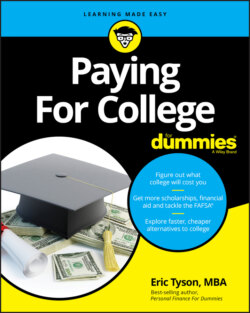Читать книгу Paying For College For Dummies - Eric Tyson - Страница 16
SUCCESSFUL PEOPLE WHO NEVER GOT A COLLEGE DEGREE
ОглавлениеYou’ve surely heard of a number of “successful” people who accomplished significantly without a college degree. This would include folks like Michael Dell founder of Dell Computers, Steve Jobs founder of Apple, Bill Gates founder of Microsoft, John Mackey founder of Whole Foods Markets, Travis Kalanick founder of Uber, Larry Ellison founder of Oracle, performers Russell Simmons and Ellen DeGeneres, fashion designer Anna Wintour, and food guru Rachel Ray to name a few. These folks obviously are outliers in terms of their high level of professional success and associated financial earnings.
And there are plenty of lower profile people who have done quite well for themselves without a college degree including some plumbers, landscapers, dental hygienists, MRI technologists, commercial pilots, physical therapist assistants, respiratory therapists, air traffic controllers, transportation inspectors, diagnostic medical sonographers, electricians, construction managers, licensed practical nurses, web developers, elevator installers, radiation therapists, massage therapists, medical assistants, firemen and police officers. I chose to highlight some of these occupations because they are populated with relatively high numbers of people without a college degree.
Now, this is not in any way to suggest that the majority of people or your kids should bypass college! Each person’s situation is unique and different. But the point is that there are many paths to career success and some of those paths include going to college whereas others do not.
Clearly, there’s likely to be value in completing a college degree and getting a degree from a program with a good reputation and track record for graduates with that type of degree. Conversely, those who don’t complete their degree or who get a degree from a program with a subpar or mediocre track record will probably get a poor return on their invested education dollars.
In Part 3 and especially in Chapter 8, I discuss the increasing numbers of shorter term and lower cost alternatives to traditional four-year colleges such as bootcamps, apprenticeships, trade schools, last mile programs, etc. The best of those programs have well-documented and impressive track records for the employment and compensation of their graduates.
